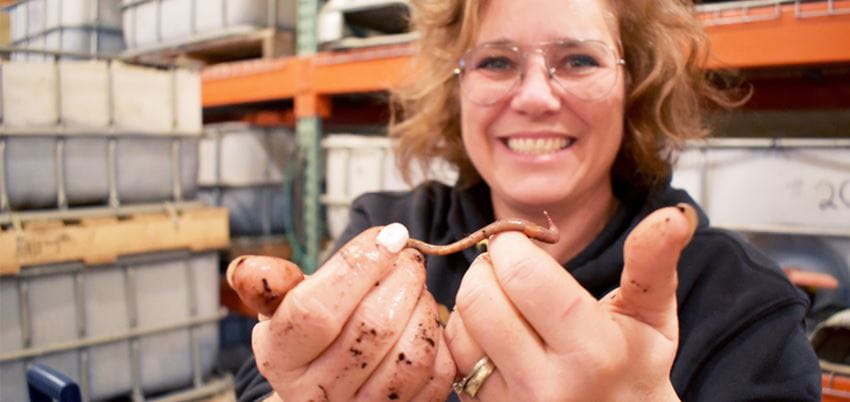Worming the way to sustainable solutions

Roxanne Doerksen loves to talk about her worms.
In just 18 months, this enthusiastic entrepreneur and environmental reclamation graduate has changed how people in southeast Alberta think about waste.
During her time as a student at Medicine Hat College (MHC), Doerksen went through the Start Up Company Program offered by the institution’s Entrepreneur Development Centre (EDC). The program provided many opportunities for Doerksen to pitch her business idea, receive valuable feedback from judges, and eventually win over $30,000 in startup funding. She launched her business, T.R.A.D. Worm Industries, in 2018 and hasn’t looked back.
Her initial business concept was to produce worm castings, or manure, as a soil amendment to support the medical cannabis industry, but her plan took a turn when local growers and residential households started contacting her about how to set up their own worm farms.
Now Doerksen isn’t the only one talking about her worms.
Community leaders are reaching out to her about how to utilize worms for composting as they deal with waste management issues. Local schools are developing pilot programs based on her expertise to teach students about worm farming and sustainability. Doerksen herself is being sought out by industry professionals and educational institutions to share her story. People are even stopping by her farm just to have a look at her operation, which currently houses between four and five million worms.
As a commercial vermicomposting company, T.R.A.D. uses worms to divert waste from landfills and support sustainable environmental solutions. Its composting service picks up organics like food waste and paper from local businesses and schools - even cut hair from beauty salons – and Doerksen and her team feed it to their growing family of worms. The worm castings are then harvested and used as a biological soil amendment to enhance the quality of growing conditions and support environmental reclamation sites. It even repairs damaged grass caused by pet waste.
“The company took on a life of its own. Waste diversion, especially organic waste diversion, has become 50 per cent of our business. The growth has been insane,” says Doerksen, who is working to triple T.R.A.D.’s capacity with construction of a new facility at her farm just outside of Medicine Hat.
Her passion for this business comes from a deep desire to leave the world in a better place.
“We’ve been allowing convenience to run our lives. Now we’re seeing the price of that convenience as our landfills reach their capacity and leachates poison our water. I want to make sure that our kids and grandkids will have a clean place to live. I have to believe this company is doing the right thing and making a difference, whether it’s easy or not. That’s how I can wake up every day and not drown under the pressure of what I’m doing.”
Pressure, and overcoming challenges, are nothing new to Doerksen. She returned to college at the age of 48 and launched a start up with no business background, but found the knowledge, skills and confidence she needed to succeed at both from MHC.
The connections she made during her time at the college have led to other opportunities for T.R.A.D., for students, and for the institution. Doerksen recently engaged the creative minds in MHC’s business program with a real world project to enhance T.R.A.D.’s marketing efforts. A portable composting unit was located at the Medicine Hat campus earlier this year to support the sustainable management of food waste and development of technology to help track and recover data related to the onsite operation. Doerksen has also shared her experiences with aspiring student entrepreneurs as the keynote speaker at other EDC pitch competitions.
She credits much of her success to her instructors, the EDC, and members of the local business community who have offered advice, professional services, and support along the way.
“I wasn’t sure how to start a business and that’s where the EDC came in. They allowed me to grow this little idea and they nurtured me in a very gentle, very kind manner. They connected me with experts in the field who were willing to teach me. Medicine Hat College and the EDC helped me keep my head above water and were systematic in answering my questions to get me where I needed to go.”
The greatest lesson Doerksen learned on her journey to entrepreneurship was to shut up and listen.
“People are amazing and willing to help. You just need to ask the right questions and then just listen. At the beginning, I thought I had to know everything even though I knew nothing. It’s been a gift to have so many amazing mentors empower me to make the hard decision and forge forward,” says Doerksen.
“Being bold and courageous are the things you need as an entrepreneur to be successful - even through your failures. I’ve heard more than once that you have to fail your way to success.”
Interested in a similar career? check out

